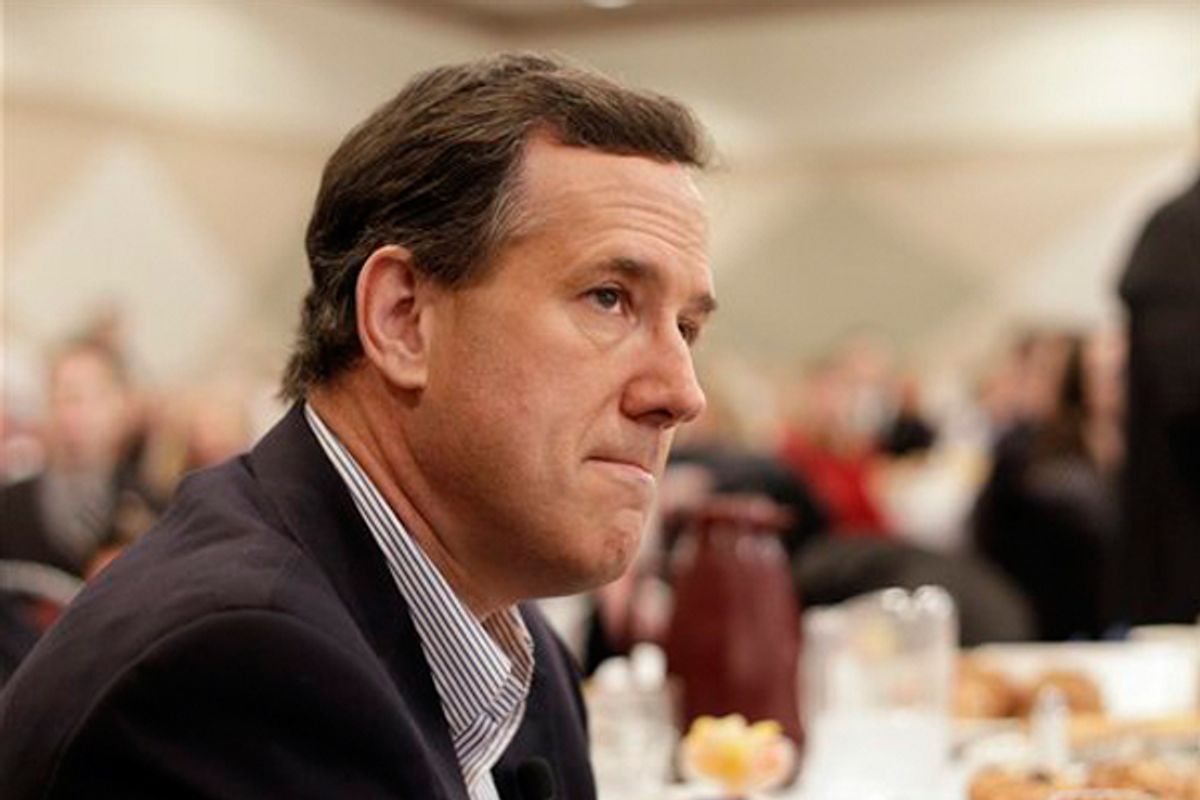Rick Santorum is our official anti-Romney candidate, and may well end up being the real-life front-runner for the Republican president nomination after tonight, which presents a bit of a problem for a lot of professional partisan Republican types: No one likes Mitt Romney at all, but Rick Santorum is horrifyingly unelectable. He is a religious fanatic who blames feminazis for telling women it's "OK" to have jobs outside the home and he is sincerely dedicated to waging a political war not just on abortion but on birth control. These positions are... not terribly popular, except among the old angry white religious men who will definitely vote Republican no matter what for the rest of their government-subsidized lives.
Romney, see, is the "more electable" candidate, which is to say that he's the guy non-fanatics might be "OK" voting for, in theory, even if he excites no one.
The solution is obvious: Just claim that Rick Santorum is actually more electable than you think. That's what the Wall Street Journal's James Taranto does today in one of his wheezy columns insisting that liberals don't understand real Americans as well as this longtime fixture at a New York City-based finance industry-aimed daily newspaper.
A poll showing Santorum doing pretty well and a Clive Crook column on Santorum's populist appeal are all the data points we need for a "contrary to what liberals say, Santorum's the real electable one" piece, and Taranto happily makes his argument:
The trouble with this is that, as we've noted, "the extremism on sexual politics" is in substantial part mythical--and the propagation of the myth doesn't seem to be hurting Santorum. The timing of USA Today's survey (Feb. 14-21 in the swing states and Feb. 20-21 nationwide) coincides with a media hysteria in which the former senator's critics have frequently exaggerated or distorted his views to make him appear more extreme than he is. If he wins the nomination, he will have several months to explain himself to an electorate in which extreme social liberals constitute a small minority. And by that point, conservatives and Republicans who are now joining in on the "extremist" attacks would have an interest in setting the record straight.
The trouble with this is that "the extremism on sexual politics" is not actually mythical at all unless you have spent a great deal of time arguing -- as Taranto has -- that most American women hate the liberal-feminist-sexual revolution so much that they would happily vote to restrict their own access to contraceptives, out of nostalgia. (But if he wins the nomination he would indeed have several months -- and a billion or so dollars worth of third-party money -- to "explain" his position, by which Taranto means obfuscate it until it seems inoffensive enough for a general election.)
There is some small truth to the "Santorum is more electable than liberal elites think" claim, but it has little to do with his form of a vocal Catholicism so conservative that it appeals more to born-again Protestants than actual American Catholics: Santorum won multiple elections in Pennsylvania -- more elections than Mitt Romney has won anywhere -- before losing by more than 700,000 votes in 2006. And he is obviously more credibly able to "connect" with "regular people" than Mitt Romney.
And in a bad economic climate, he sort of addresses blue collar concerns. If Rick Santorum were a bit to the left on fiscal issues he might actually be a formidable national candidate, but even now a fair portion of his success in the 2012 campaign has come from sounding class-conscious, even as he decries Obama's peculiar form of socialist/Islamic indoctrination via post-secondary schooling. Before America's parties finished their ideological realignment in the late 20th century a conservative Catholic politician like Santorum might well have been on the "left wing" on economic issues -- like Father Coughlin, before he went full-on Nazi. But there's still traces of that economic populist language in his campaigning, even if the meat of his policy prescriptions are Wall Street Journal editorial page-approved upward-redistributionism. Clive Crook actually sort of gets this point, even if he thinks Democrats are intrinsically bad at populism and not effectively prohibited from attempting it by the moderating influences of a center-right elite media, center-right party leaders, and Wall Street money.
But according to Taranto, the reason Democrats don't do populism as well as Rick Santorum is simple:
The obvious answer is oikophobia: The liberal left is disdainful, both culturally and ideologically, of Middle America, and that is why the Democratic Party keeps nominating meritocratic toffs like Al Gore, John Kerry and Barack Obama.
Yes right of course. And Barack Obama and Al Gore both received more actual votes than the Republican candidate. (Not votes from real people, I guess?)
So, Rick Santorum is more populist -- and hence popular -- than Mitt Romney. Does that actually mean more electable? Oh my god no, doesn't anyone remember Terri Schiavo? Actual Americans are terrified of theocratic assholes like Rick Santorum.



Shares